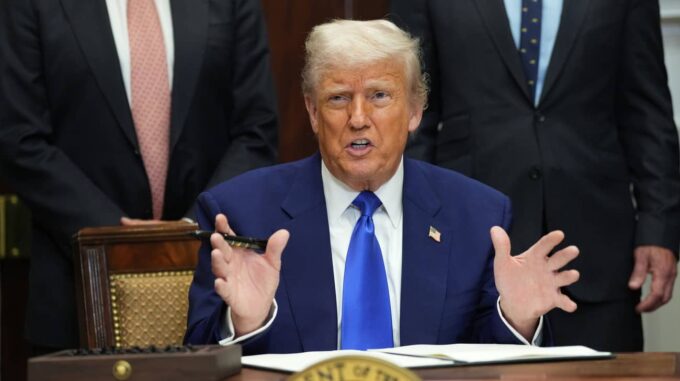Donald Trump stated that Israel launched a devastating strike on Iran’s nuclear program, casting doubt on its existence

In a surprising comment that caught many experts and international observers off guard, former U.S. President Donald Trump openly announced that Israeli military operations delivered a serious, nearly destructive blow to Iran’s nuclear program. According to him, it is now unknown what the current state of the program is—whether it still exists at all or has been completely destroyed. These remarks came in an interview with the reputable agency Reuters, which was subsequently widely circulated through Ukrainian media, including "European Truth." During the conversation, Trump emphasized that the situation surrounding Iran’s nuclear program has become unexpectedly complex and unpredictable following the operation. When asked about the current status of the program, he stated: “No one can now say whether it still exists or has been practically obliterated. This is — very serious damage.” The U.S. President also underscored that Washington remains open to diplomatic negotiations with Tehran regarding nuclear issues. Notably, the planned meeting with Iranian representatives on Sunday is currently in question: “It’s hard now to say whether this meeting will take place. We have it scheduled, but the situation is very fluid.” Trump assured that Washington remains ready for dialogue, but also warned of possible complications. Additionally, he confirmed that the U.S. was informed in advance about the preparations for the Israeli strike — a fact that could shed light on the complex diplomatic game and behind-the-scenes maneuvers in the relationship between Washington and Israel. “We knew about the preparations for this operation and tried our best to save Iran from complete humiliation and destruction. I personally tried to intervene to prevent escalation and to maintain the possibility of reaching an agreement,” Trump noted. He emphasized that there is still a chance to return to negotiations and agreements with Iran, stressing: “Not everything is lost — agreements can be made, and it’s not too late.” According to official reports, the night from June 12 to 13 marked a new and significant escalation. Israel carried out a series of airstrikes targeting facilities in Iran directly related to Iran’s nuclear program. It is reported that the targets were chosen to stop the advancement of Iran’s nuclear potential, as Israeli military and political circles declare that the goal of the operation is to prevent Iran from obtaining nuclear weapons. Immediately after the attack, initial official statements about the consequences appeared. Sources indicated that several high-ranking officials of Iran’s security apparatus, including the Commander of the Islamic Revolutionary Guard Corps, Hossein Salami, were killed in the strikes. This caused a broad resonance in the region and led to a new wave of tension. The Iranian deputy prime minister and senior officials, including Ayatollah Ali Khamenei, promptly confirmed the death of several military elites and promised that Iran will definitely respond to Israel and will not let this incident go unpunished. In turn, the Israeli Defense Ministry’s official spokesperson emphasized that the strikes were carried out in accordance with high safety standards and that the military operation was a one-time action aimed at halting Iranian nuclear developments. At the same time, cautious warnings appeared in international and U.S. diplomatic circles: experts stress that unilateral military actions always increase the risks of escalation and complicate efforts to find a peaceful solution. U.S. Secretary of State Marco Rubio issued a statement emphasizing that the U.S. had advance knowledge of Israel’s plans, but noted that this activity was conducted with bilateral approval and coordinated with the United States. He also stressed that while Washington understands the importance of curbing Iran’s nuclear program, all actions should comply with international law and seek diplomatic resolution. Currently, the international community is monitoring the developments closely. International organizations call for calm and avoiding further provocations, while diplomatic circles hope that over time, the situation will stabilize and the parties will return to negotiations. At the same time, many analysts warn that recent events could significantly alter the balance of power in the region and cast doubt on the possibility of returning to a diplomatic resolution of the Iran nuclear issue.

